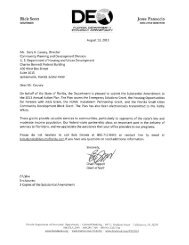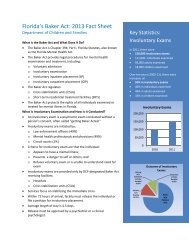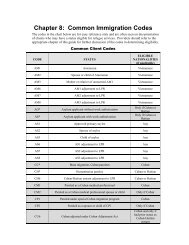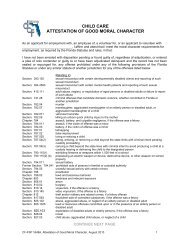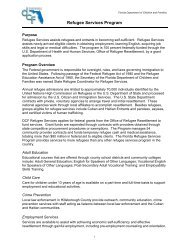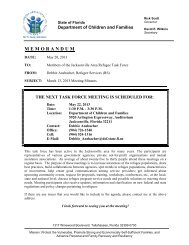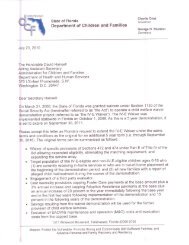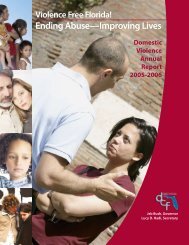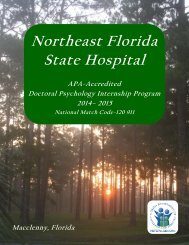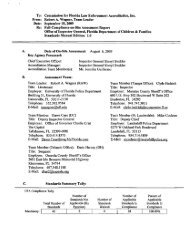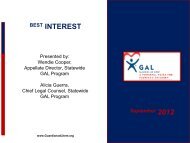The National Strategy for Child Exploitation Prevention and Interdiction
The National Strategy for Child Exploitation Prevention and Interdiction
The National Strategy for Child Exploitation Prevention and Interdiction
Create successful ePaper yourself
Turn your PDF publications into a flip-book with our unique Google optimized e-Paper software.
c. Department of State’s International Ef<strong>for</strong>ts<strong>The</strong> President’s Interagency Task Force to Combat Trafficking in Persons (PITF) is a Cabinetlevelentity m<strong>and</strong>ated by the Trafficking Victims Protection Act whose purpose is to coordinategovernment-wide ef<strong>for</strong>ts to combat human trafficking. It is chaired by the Secretary of State.<strong>The</strong> Senior Policy Operating Group (SPOG) coordinates activities of Federal departments <strong>and</strong>agencies regarding policies, including grants <strong>and</strong> grant policies, involving trafficking in persons<strong>and</strong> the implementation of the TVPA. <strong>The</strong> SPOG consists of senior officials designated asrepresentatives by the PITF members <strong>and</strong> is chaired by the Director of the Office to Monitor <strong>and</strong>Combat Trafficking at the Department of State. Three st<strong>and</strong>ing committees include Research &Data, Grantmaking, <strong>and</strong> Public Affairs.Through the Office to Monitor <strong>and</strong> Combat Trafficking in Persons (G/TIP), the Department ofState helps to lead the international ef<strong>for</strong>ts in the global movement to abolish modern-dayslavery. It engages with <strong>for</strong>eign governments, civil society, <strong>and</strong> multilateral organizations, tofight human trafficking around the world. G/TIP has built global awareness of modern-dayslavery through nine annual Trafficking in Persons (TIP) Reports, covering 176 countries in2009(compared to 82 in 2001). <strong>The</strong> Report is the U.S. Government’s principal diplomatic toolused to engage <strong>for</strong>eign governments on the subject as well as an important reference <strong>for</strong> targetingU.S. <strong>for</strong>eign assistance funding. It is also the world’s most comprehensive compendium of antihumantrafficking ef<strong>for</strong>ts <strong>and</strong> reflects the USG’s global leadership on this key human rightsissue. In preparation <strong>for</strong> the 2010 Report due to be released in June, the Ambassador-at-Large<strong>and</strong>/or G/TIP Reports <strong>and</strong> Political Affairs staff traveled to 50 countries to meet with <strong>for</strong>eigngovernment officials, international organizations <strong>and</strong> NGO representatives.Pursuant to the TVPRA of 2005, the TIP Report now includes assessments of <strong>for</strong>eigngovernments’ ef<strong>for</strong>ts to combat dem<strong>and</strong>, including punishment of its citizens <strong>for</strong> engaging inchild sexual exploitation overseas. G/TIP has widely disseminated anti-TIP in<strong>for</strong>mation throughelectronic <strong>and</strong> print media, the Internet, <strong>and</strong> digital video conferences – reaching over 1 billionpeople in 2009. In FY 2009, G/TIP obligated more than $26 million <strong>for</strong> anti-human traffickingprograms: 80 projects in 50 countries totaling approximately $21.85 million, five regionalprojects totaling $2.25 million, <strong>and</strong> eight global projects totaling roughly $1.9 million. Nearly allof these awards were funded through the office’s annual competitive grant process. A completelist of G/TIP awarded projects <strong>and</strong> descriptions are available athttp://www.state.gov/g/tip/rls/other/2009/131167.htm.G/TIP’s programmatic work is part of a larger ef<strong>for</strong>t of United States agencies which has spentover $688 million on international anti-human trafficking programs since FY 2001 – ef<strong>for</strong>tsG/TIP helps coordinate by chairing the SPOG. G/TIP has also raised awareness on child sextourism (CST) through funding public awareness <strong>and</strong> deterrence campaigns, supporting researchon CST, engaging the travel, tourism, <strong>and</strong> hospitality community, compiling in<strong>for</strong>mationalresources, <strong>and</strong> facilitating educational film releases on the topic.107



